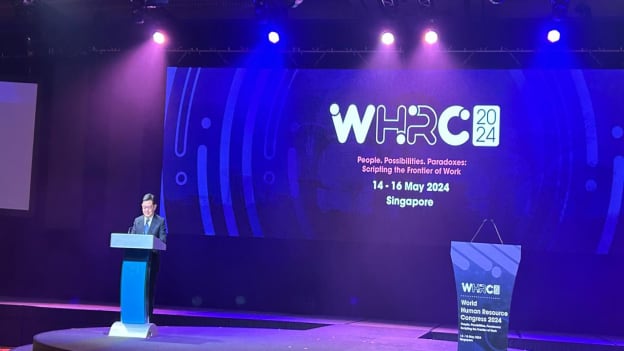Singapore's Heng Swee Keat: 3 elements HR must prepare for

With the average worker facing rapid technological changes in the workplace and the pressure of frequent upskilling and reskilling, the theme of World Human Resource Congress 2024 – People. Possibilities. Paradoxes – is timely, said Singapore's Deputy Prime Minister Heng Swee Keat in his opening address at the global event
Heng proposed three elements HR professionals must prepare for in this time of constant change: the future of jobs and skills, the future of talent management, and the future of HR.
The future of jobs and skills
"The future of jobs will be characterised by the need for training and upskilling throughout one's career," he said. "This can induce stress and anxiety among companies and workers and, as a result being, left behind is real."
Heng encouraged HR professionals to help to "ease these concerns by mapping how jobs and skills are expected to evolve, so that companies and workers are better placed to prepare and respond".
READ MORE | Singapore sets the stage for World Human Resource Congress 2024
Mapping out change would be best done as a collaborative effort between companies, workers, government agencies, trade associations and unions. Different stakeholders "bring different perspectives but share in the goal of preparing better for the future".
Singapore took the same multi-sectoral approach when it developed 23 industry transformation maps and 17 jobs transformation maps, Heng said.
"[Stakeholders] bring different players within each industry together to map out the key challenges that the industry will face and how to address them holistically. This enables them to leverage one another's strengths to transform each industry to be future-ready, sustainable, and offering high-quality jobs for workers," he said.
"With this broad direction set, we encourage every worker to take charge of their own career and chart their own learning journey. We must create the conditions for workers to embrace lifelong learning and take charge of their career growth."
The future of talent management
The Deputy Prime Minister shed light on a more strategic question confronting business and talent leaders today – how to engage and nurture talent so that they are connected, thriving and contributing their best.
"We know that the expectations and aspirations of workers are evolving. Post-pandemic, workers are seeking greater purpose and engagement at the workplace and beyond. Many workers also face increasing caregiving needs, both to take care of their young children and their ageing parents," Heng said.
"To keep pace with these changing needs and remain attractive to talent, companies will need to incorporate progressive employment practices into their workplace norms. These include flexible work arrangements, such as standard hours and part-time work, as well as remote work options to help workers balance their different responsibilities.
"Companies also need to be more proactive in supporting specific segments such as seniors and attending to the well-being of their workers," he said. "Besides building supportive workplace norms, another aspect of talent management is to design pathways for employees to realise their full potential and enjoy meaningful careers."
The future of HR
Heng closed his speech by urging HR professionals to become "the bridge between businesses and people".
"Driving structural changes requires a range of tools – from vision to metrics to programs – to drive alignment and ensure shared outcomes," the official said.
"Crucially, the key is to bring everyone in the organisation along and optimise the deployment of skills and talent to support business growth.
"With the evolving strategic role of HR, HR professionals themselves need to build up new skill sets in areas like data analytics, talent management in a tech-driven world, and understanding the evolving needs of the future workforce. Professional HR certification is an important avenue to build capability."














